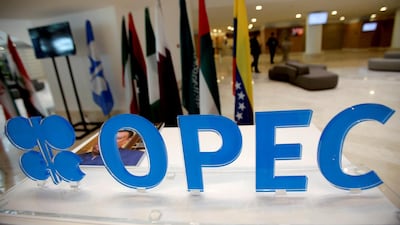All eyes will be on Opec+, the group of producers behind dramatic market corrections as they gather for their second ministerial monitoring committee meeting on Wednesday.
The group, which paused earlier plans to incrementally increase production will scrutinise the compliance of its members, amid reports of quota-busting amid higher prices.
Opec+ has been credited with helping global oil markets recover from plummeting demand in 2020 in the wake of a global recession induced by the Covid-19 pandemic. Last year's market volatility led to West Texas Intermediate (WTI), the US benchmark for crude, trade briefly below zero in April as supply exceeded available storage capacity.
Markets have since stabilised. Riding the wave of a "commodity supercycle", Brent the international benchmark for oil and WTI have each surged 10 per cent since the beginning of 2021. Oil's gains, propelled by recovery in Asia, a softer dollar and vaccination programmes in developed economies, have also been aided by the group's proactiveness.
At the start of the year, Opec linchpin Saudi Arabia, unilaterally decided to implement a 1 million barrel a day cut until March. The oil bloc shelved an earlier plan to bring 2m bpd back to the market and is drawing back 7.2m bpd from the market for three months from January, equivalent to about 7 per cent of global supplies.
Ahead of a Joint Ministerial Monitoring Committee on Wednesday, Opec+ compliance levels have reportedly dropped to 99 per cent from 101 per cent in November, according market intelligence provider Argus.
Saudi Arabia's cut came at a time when Russia, the biggest producer in the group, and Kazakhstan were exempted from the cuts and allowed to increase production by 65,000 bpd.
The cohesiveness of the group is likely to be tested over this week's meeting.
"Cohesion remains fragile," analysts from Swiss bank Julius Baer said in a 2021 commodities outlook note. "Some petro-nations are under heavy financial strain and need cash flows urgently. Others see the burden unfairly distributed, not taking into account recent investments and capacity expansions adequately," it said.
Opec+ will have to find a way to work with producers such as Iraq, which are under significant fiscal strain to export more. The group will also have to listen to the concerns form other members, which have grown impatient with non-compliance from some producers.
The return of Iranian and Venezuelan oil is unlikely to be immediate.
"High oil prices could be interpreted as policy success and could convince some members to produce beyond quotas," Julius Baer said. "High oil prices could also raise demand for Iranian oil, which sells at a discount due to sanctions."
Vitaly Yermakov, senior research fellow at the Oxford Institute for Energy Studies, is more optimistic about various tradeoffs and arrangements within the Opec+ grouping.
"I think the Saudis are trying to accommodate some of Russia's concerns caused by really some seasonal technical reasons to slightly increase its output," he told a briefing organised by Dubai consultancy Gulf Intelligence.
"Free riders" in the US shale basins, could pose the biggest challenge he added, if the companies ramp up production amid higher prices.
"If the response from the US is as strong as it was in 2017-2018, then it creates the old conundrum between oil market managers and free riders," Mr Yermakov said.


